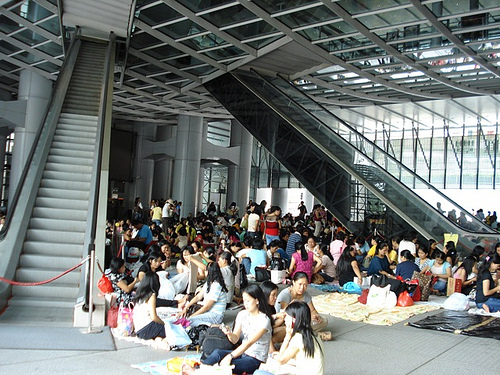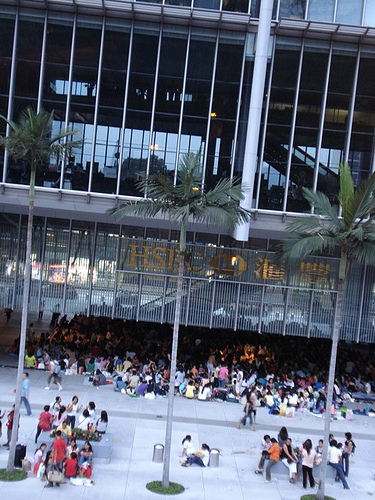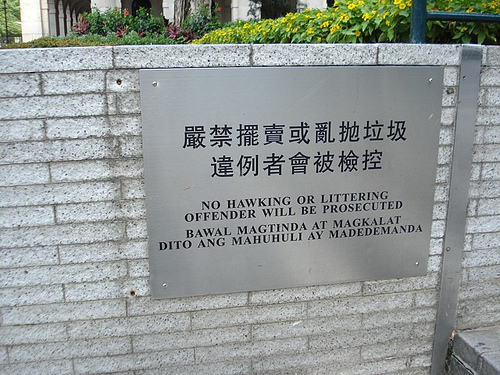“It’s like all the Mexicans in New York City just stopped working one day,” said CEO Intern D as I was walking with him in HK Central one Sunday afternoon.
His comparison seems apt, so just suspend your PC-sense for a minute while I run with the analogy. Imagine every Sunday all the Mexicans in NYC with low-skilled jobs (We don’t have to pick on only the Mexicans. Take the Pakistani cabbies, Chinese restaurant owners, insert your favorite ethnic stereotype here) stop working, go to Wall Street or Times Square, and just throw one big street party. Imagine they hawk goods, snack on Mexican food, play cards with friends, sit on picnic blankets on shaded sidewalk areas, and just generally have a rockin’ fun time without giving a shit about the disapproving stares and upturned noses of white passersby.
Imagine that and you’ll have a pretty good picture of the scene in HK every Sunday when the majority of the city’s domestic laborers take the day off. These laborers, officially called foreign domestic helpers (FDH), are predominantly Filipino or Indonesian and overwhelmingly female. HKers employ them to cook, clean, and take care of their kids. Sure, folks in the US hire maids and babysitters, but FDHs have been institutionalized into HK’s very fabric of life. Unfortunately, the prevalence of FDHs has created some vexing socioeconomic/ethnic problems.
FDHs make up 3% (> 220,000) of HK’s population. More than half are Filipino, over 40% Indonesian, and the rest Southeast Asians. FDHs are essentially live-in maids who work six days a week for their employers. On their day off, since they don’t have their own houses, they pick a spot in the streets of HK and meet up with friends. The mass exodus is spontaneously coordinated so that certain ethnicities claim certain parts of HK. Filipinos take to Central, Indonesians congregate along the island’s waterfront, and South Asians make themselves home in Kowloon’s Tsim Sha Tsui.

In Maid to Order in Hong Kong, Nicole Constable describes domestic work’s evolution in HK, today’s FDH system, employers’ exploitation of their female laborers, and FDH’s resistance against their employers. It’s not exactly a page-turner, but Constable has done thorough research and presents a wealth of statistical evidence and personal stories.
On June 25th, a proposed minimum wage law excluding FDHs caused some controversy, but the tensions existed long before that. There have been reports of FDHs suffering physical and sexual abuse from their employers, debate on whether Filipino maids should be allowed to gather in Central on Sundays, uproar over a children’s doll manufactured with a Philippine passport and work contract as accessories, and the occasional allegation that a maid has spiked her boss’ meal with menstrual blood.
From what I know so far, the Filipino and Indonesian economies aren’t as strong as HK’s, so many women from these two countries become domestic workers abroad in order to earn more money than they could back home. Indeed, one common argument against the passage of legislation favorable to FDHs is that they’re already being treated very well in HK and wouldn’t choose to work here if the money didn’t compensate them. Although some Filipino and Indonesian women might view the prospect of being a HK FDH at first as a wonderful opportunity, becoming a maid in a foreign country is not always solely their choice nor do they have complete knowledge of the fantastic working conditions they can look forward to.


Filipino and Indonesian women are often pressured by their families to work abroad and send remittances back home so that father can buy some land or little sis can go to university like she always dreamed. A whole entire industry has sprung up to accommodate HK’s demand for foreign domestic labor. There are FDH agencies operating on both sides to broker deals between prospective employers and employees. Unfortunately, the odds are frequently stacked against the employees who have less regulatory protection and receive little, if any, background info on their employers or disclosures about the nightmarish immigration process that burdens them with fees and restrictions.
It’s astounding how much the Philippine economy depends on FDH remittances. According to Constable,
By 2003 remittances reached US$7.6 billion dollars a year, approximately 10 percent of the gross domestic product. According to the Asian Migrant Centre, the average migrant worker supports five people at home, and one out of every five Filipinos directly depends on migrant workers’ earnings.

The whole FDH situation is tainted with overt racism. Domestic chores in HK used to be done by Chinese servants, but now people are associating foreign workers’ darker skin color with a penchant for scrubbing dishes. Some HK kids even refer to their FDH as “my Filipino.”
It’s ironic Filipino maids are often highly educated, sometimes more so than their employers. Constable cites a study indicating almost 50 percent of all domestic workers had a high school education, and an additional 38 percent had attended college or university. But their economy sucks, and now their diplomas go towards mopping the floor.
FDHs face ridiculous restrictions on their behavior such as when/how often/how long to take showers and wash their hair to not being able to wear dresses or putting on lipstick while working.
To Constable, all of these restrictions are methods of control. Constable’s a big fan of Michel Foucault’s Discipline and Punish and applies a lot of his theories on power and discipline to the employer-FDH relationship (I guess Contemporary Civilization is useful after all).
A lot of the strife between employers and employees stems from HK employers’ lack of cultural sensitivity. Constable recounts stories about how maids are forced to prepare pork when they might be Muslim (and hence forbidden from eating our curly-tailed friends) to taking showers at night when they believe this causes the body to be more susceptible to illness.
Constable stresses, however, that FDHs are not all passive, helpless, and docile. Filipinos are increasingly getting street-smart about the whole life-as-maid-in-HK situation (a reason why hires of Indonesian women, who don’t know the ropes of HK as well, are skyrocketing), and many are not shy about protesting, standing up to their employers, or disobeying rules. They join FDH support networks and organizations that lobby the government and provide support for its members. They’ll sue their employers for cheating them out of their money or being abusive. They aren’t allowed to hawk goods on the street, but many do so anyways, and when they are caught by police, they pretend they’re giving a birthday gift to their customer and the surrounding crowd plays along nonchalantly.

Of course, not all FDH-employer relationships are unsavory. Some develop very warm, close ties to their host family, but these are the exceptions to the rule. Both in HK and in the home countries, migrant female domestic labor has created some downright difficult socioeconomic conundrums. Troubles, however, seem to dissipate on Sundays when the streets fill up with chattering, lively women who, for this one day at least, make the city their own.